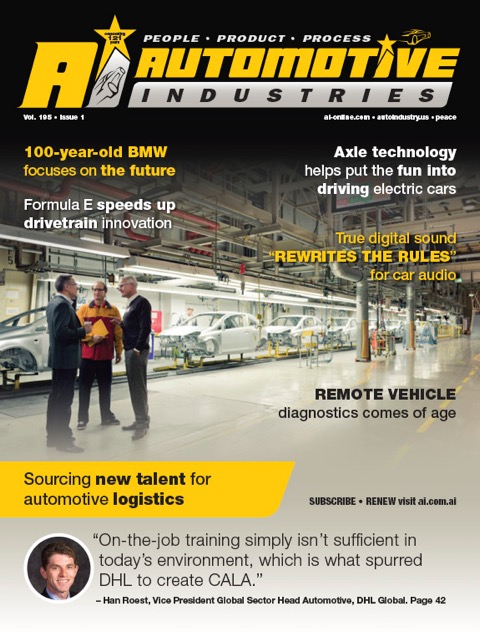
Supply chain efficiency – or the lack thereof – has become a key differentiator in the automotive industry. Without the necessary talent pool OEMs are not in a position to optimize their complex supply chains, which ultimately leads to higher costs, lower margins and a reduced opportunity for investment in revenue-generating initiatives.
Automotive Industries (AI) asked Han Roest, Vice President Global Sector Head Automotive, DHL Global Forwarding, how serious the talent shortage is in the automotive supply chain industry.
Roest: The current talent shortage is significant. This applies not only to service providers such as DHL, but also to our customers, the OEMs and Tier suppliers. It is estimated that there are six vacant positions to fill for each new supply chain graduate, and this trend is only worsening as the baby boomer generation reaches retirement age at an alarming rate. The talent shortage spans geographic regions as well, making the challenge universal in scope. Last year DHL sponsored the production and publication of a white paper on this subject, which was written by Lisa Harrington, a Senior Research Fellow at the Supply Chain Management Center at the University of Maryland. The white paper examined the various causes of the talent shortage and the risk it poses to the automotive industry.
AI: What threat does it pose to auto manufacturers?
Roest: Over the past decade a number of conflicting trends have negatively impacted supply chain talent in the automotive sector, both qualitatively and quantitatively. Due to the downturn in the sector many jobs were lost, and supply chain personnel were not immune to this trend. At the same time, the industry has become much more complex. OEMs and their Tier suppliers are now opening manufacturing facilities in emerging markets, and vehicles are being built with a significantly higher number of components than they were just a decade ago.
Auto manufacturers now find themselves launching new vehicle programs in more complex markets, with more demanding supply chain requirements, but with fewer, lower-qualified people to support them. The impact could be quite dramatic: delayed program launches, increased premium transportation costs to ensure supply chain integrity and a potential reduction in market share if launches are impacted severely enough.
AI: What remedial steps does DHL’s Corporate Automotive Logistics Academy 4.0 offer?
Roest: Two years ago DHL developed the Corporate Automotive Logistics Academy 4.0 (CALA) in an effort to bring a collaborative approach to the market to help close the gap in the industry’s talent shortage. The program was developed under DHL’s Christiane Beimel in collaboration with BVL, a leading academic institution in Germany.
CALA provides an interactive, academic classroom setting with highly-trained professors to optimize the learning experience. Different learning modules were identified and developed for a target audience of supply chain employees from OEMs, Tier suppliers and logistics providers. Each module addresses a different aspect of the supply chain industry, ranging from aftermarket logistics to supply chain procurements. They provide students with unique perspectives on many topics, allowing them to become more well-rounded and knowledgeable regarding supply chain challenges. On-the-job training simply isn’t sufficient in today’s environment, which is what spurred DHL to create CALA.
AI: How successful has your CALA 4.0 been so far in this mission?
Roest: DHL has conducted four CALA sessions so far: one each in Europe and in Asia, and two in the Americas (Brazil and the U.S.). The feedback from the participants has been very positive. DHL and BVL continue to use the feedback from each session’s participants to continuously improve our learning modules, and now plan to introduce the course in other countries this year. The goal is to reach as many supply chain specialists as possible to help expand overall knowledge throughout the industry.
AI: How difficult is it to convince talented youngsters in countries like India to join supply chain management? Especially since it is a nascent industry in these regions?
Roest: The opportunities are truly unlimited for motivated and talented youngsters in countries with emerging markets, such as India. Historically, however, the supply chain industry isn’t seen as “sexy” or attractive, and it therefore does not have a major draw as a desired career. This must be addressed at the university level, where we have seen an increase in supply chain classes that are offered, but instead of students falling back on a supply chain career as a second choice, it must be promoted as a desirable career with attractive benefits. DHL intends to continue to collaborate with other leading industry experts to help in that regard.
AI: Where do you see the shortage of talent becoming particularly grim – emerging markets or developed regions – and how can your automotive logistics academy help?
Roest: I see different factors that have led to the talent shortage in the different markets. Whereas the developed regions are facing a talent shortage due to reduced numbers of experts (due to attrition, retirement and increase in demand for talent), the emerging markets’ talent shortage is based on it being a newly-developed industry. Just 10 or 20 years ago there may not have been an automotive manufacturing industry in these countries at all, so there was never a need for knowledgeable supply chain employees.
Based on the above, I feel that the talent gap is particularly concerning in developed nations. In emerging markets, I feel there is a larger opportunity to establish programs to educate people who will then become supply chain experts. It will require a joint approach between academic institutions backed by public funding, manufacturing companies offering attractive internship programs to university students and service providers such as DHL through initiatives such as its Corporate Automotive Logistics Academy. CALA is currently looking into the possibility of developing learning modules customized to address the specific supply chain challenges of emerging markets. Together, we must craft a positive and attractive image for a supply chain career, and thus help to eventually resolve the talent shortage.














More Stories
Cybord TCI – The Future of Manufacturing Integrity
Meet Rita Case – recipient of 2024 NAMAD Lifetime Achievement Award
Automotive Industries (AI) Newsletter October 2024